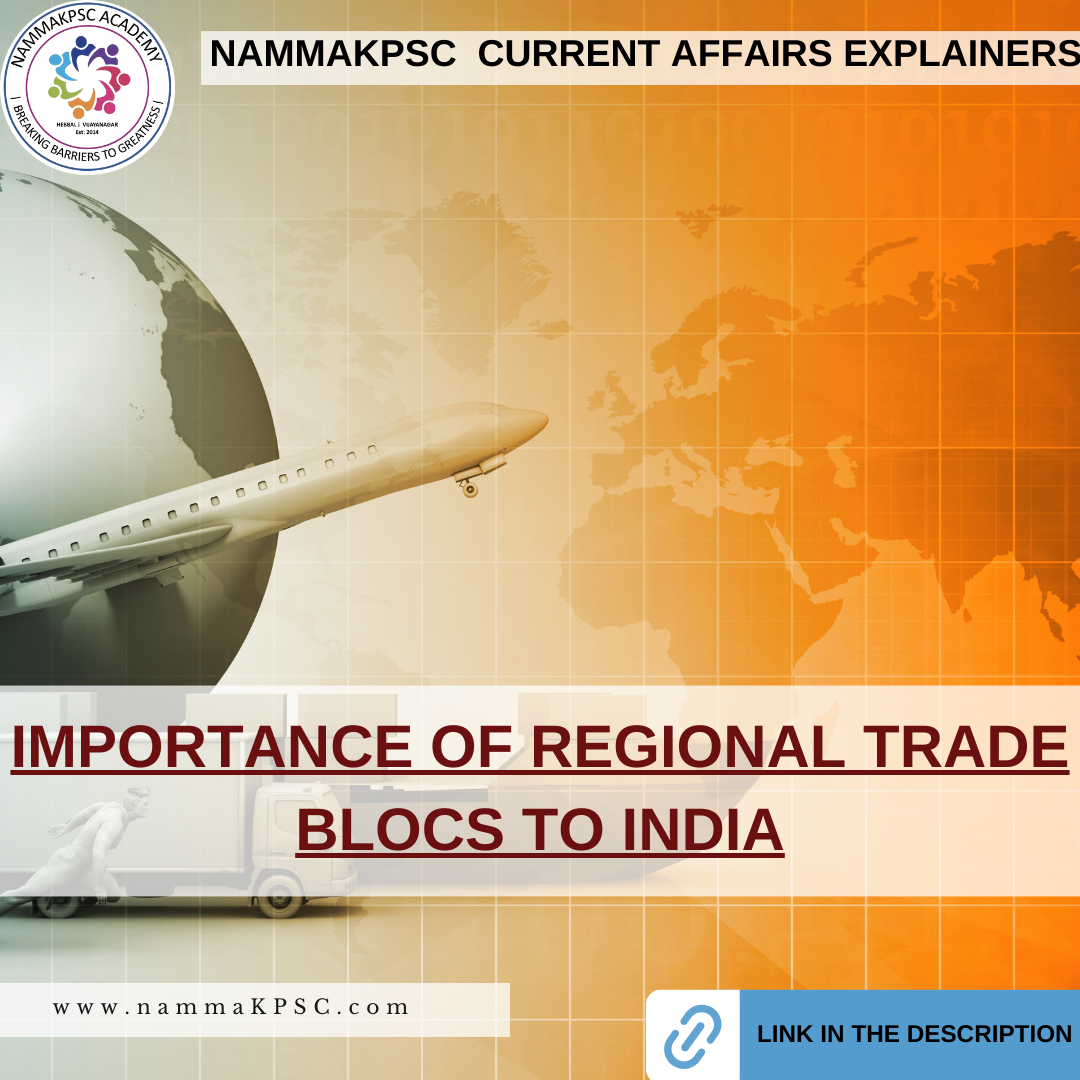IMPORTANCE OF REGIONAL TRADE BLOCS TO INDIA
IMPORTANCE OF REGIONAL TRADE BLOCS TO INDIA

India, with its dynamic and rapidly growing economy, actively participates in various regional trade blocs, each designed to foster economic integration, enhance competitiveness, and facilitate collaborative development. Notable examples include NAFTA (North American Free Trade Agreement), RCEP (Regional Comprehensive Economic Partnership), and others.
- Economic Advantages:
Participating in regional trade blocs brings substantial economic advantages to India. By reducing or eliminating tariffs and trade barriers among member nations, these agreements create a more open and integrated market. For India, this means expanded market access for its goods and services, providing a boost to exports. The North American Free Trade Agreement (NAFTA), although not directly involving India, serves as an example of how economic integration can lead to increased trade and economic growth within the region.
India’s involvement in the Regional Comprehensive Economic Partnership (RCEP) is particularly noteworthy. RCEP, comprising 15 countries in the Asia-Pacific region, aims to create a free trade area. By being part of this agreement, India gains access to a vast market with diverse consumer bases, fostering increased trade and economic opportunities.
- Trade Diversification:
Active participation in regional trade blocs allows India to diversify its trade portfolio. Relying on a wide range of trading partners reduces dependency on any single market, thereby mitigating risks associated with economic fluctuations in specific regions. By diversifying its trade destinations, India becomes more resilient to global economic uncertainties.
In the context of RCEP, India’s inclusion provides an opportunity to diversify trade ties across the Asia-Pacific region. This not only spreads economic risks but also opens avenues for new markets, contributing to India’s economic stability and growth.
- Strengthening Regional Influence:
Engagement in regional trade blocs enhances India’s influence in regional geopolitics. As a key player in economic alliances, India gains strategic importance and becomes an integral part of decision-making processes. By aligning economic interests with neighboring nations, India can shape regional policies, fostering a collaborative approach to addressing shared challenges.
India’s participation in organizations such as the South Asian Association for Regional Cooperation (SAARC) and the Bay of Bengal Initiative for Multi-Sectoral Technical and Economic Cooperation (BIMSTEC) underscores its commitment to regional cooperation. Through these forums, India actively engages in dialogue and collaboration, promoting regional stability and development.
- Economic Reforms and Global Standards:
Regional trade blocs often necessitate domestic economic reforms to align with global standards. For India, this is an opportunity to enhance its regulatory environment, improve infrastructure, and implement structural changes that promote economic efficiency and competitiveness. By adopting global best practices, India positions itself as an attractive destination for foreign investments and strengthens its economic foundations.
The adoption of the Goods and Services Tax (GST) in India is an example of domestic economic reform aligned with global standards. The implementation of GST aimed to streamline taxation, reduce complexities, and make India’s tax structure more compatible with international norms, facilitating smoother trade within the region.
- Technology and Innovation Collaboration:
Regional trade blocs offer platforms for technology and innovation collaboration among member nations. By sharing resources and expertise, countries can collectively invest in research and development, fostering technological advancements that enhance economic competitiveness. Collaboration in areas such as digital innovation, renewable energy, and healthcare technologies can contribute to sustainable development.
India’s active participation in the ASEAN-India Innovation Platform and similar initiatives demonstrates its commitment to technology collaboration. By engaging in joint research projects and knowledge exchange, India leverages regional expertise, contributing to its technological advancements and economic progress.
- Mitigating Global Economic Challenges:
Active participation in regional trade blocs provides India with a buffer against global economic challenges. By collaborating with neighboring nations, India can respond collectively to economic uncertainties, trade disruptions, and other global challenges. This collaborative resilience enhances the ability of member nations to navigate and overcome shared economic obstacles.
The COVID-19 pandemic highlighted the importance of regional collaboration. India, as part of the SAARC COVID-19 Emergency Fund and through its engagement with organizations like BIMSTEC, actively cooperated with neighboring countries to address health and economic challenges arising from the pandemic.
- Social and Cultural Exchanges:
Participation in regional trade blocs facilitates social and cultural exchanges, fostering people-to-people contact and a sense of community. Increased interactions through business collaborations, tourism, and educational exchanges create stronger social ties among member nations. This cultural integration contributes to diplomatic relations, fostering a shared regional identity.
India’s involvement in regional organizations like SAARC goes beyond economic considerations, encompassing cultural exchanges and diplomatic cooperation. These interactions contribute to regional harmony and a deeper understanding among nations, paving the way for strengthened relations.
- Addressing Environmental Challenges:
Regional trade blocs provide platforms for member nations to collectively address environmental challenges. By establishing common environmental standards and regulations, countries can work together to promote sustainable practices and mitigate the adverse impact of economic activities on the environment. Shared commitment to environmental sustainability can lead to collaborative efforts for climate change mitigation and adaptation.
As part of global initiatives, India’s engagement in regional environmental cooperation, such as the BIMSTEC Environment Ministers’ Meeting, underscores its commitment to addressing environmental challenges collaboratively. This engagement can contribute to sustainable development and a greener regional economy.
Conclusion:
In conclusion, the importance of regional trade blocs to India extends far beyond economic considerations. These alliances contribute to economic growth, strategic influence, and socio-cultural exchanges. Active participation in regional organizations positions India as a key player in shaping regional and global dynamics. As the world becomes increasingly interconnected, India’s engagement in regional trade blocs stands as a testament to its commitment to collaborative development, economic integration, and shared prosperity in the evolving landscape of international relations.

